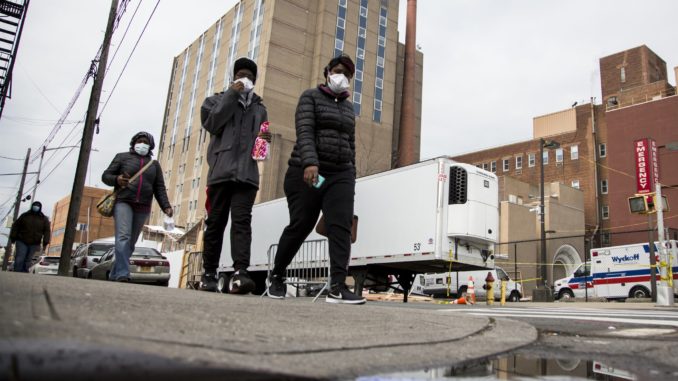

A 15-pound poodle-mix, Banneker is far from your typical guard dog. Yet his owner, André Carrington, always makes sure to bring the puppy along as an added layer of protection when they leave home in Philadelphia for their daily walks.
“I think it actually matters that when I’m walking in public, the fact that I have a cute dog makes people feel more comfortable,” Carrington, an associate professor of African American literature at Drexel University, told NBC News. “I don’t think it would be as easy for me to avoid scrutiny in public, especially wearing my mask, if I didn’t have Banneker with me.”
Greg Iwinski, a comedy writer in New York City, who, like Carrington, is black, says he also takes added precautions to avoid drawing unwanted attention to himself while going outside during the coronavirus outbreak. While Iwinksi doesn’t have a dog, he finds strapping his 1-year-old son, who is biracial, in a stroller before venturing out is an equally effective “mitigating factor.”
“It’s sending a signal: ‘Look, I have a cute baby. I can’t be that scary,’” Iwinski said. “And so I go with him whenever I go grocery shopping, partly because he is going insane not being able to go to the playground, and partly as a buffer.”
The only time Iwinski doesn’t take his son out is when he is going for a run, but in those instances, he hopes his jogging gear communicates his intent.
Many people of color, particularly black men, had grown accustomed well before the coronavirus outbreak to adjusting the way they present themselves in public so they don’t appear threatening to law enforcement or their white peers.
From walking with their pets and children to only wearing medical masks to forgoing masks all together, black Americans, who have been disproportionately affected by the global pandemic, and others are taking precautions to ensure that following the CDC’s recommendation doesn’t put them at further risk.
“The CDC coming to you and saying ‘put a bandana over your face, walk out and that will make you more safe,’ as a black man in New York City, it’s like them saying put on a hoodie and walk behind a white grandma. That’s not how life works for us,” Iwinski said. “I already have people crossing the street to avoid me when I’m wearing my Warby Parker glasses and I sound like this. I’m very white-comfortable and even I’m thinking about: ‘Oh, am I wearing all red? Am I wearing all blue?”
According to Mark Anthony Neal, chair of the department of African and African American studies at Duke University, bandanas have historically been associated with violence against people of color and wearing certain colors “in the wrong context” has gotten people killed.
Red bandannas and blue bandanas in particular have been connected with gang affiliation and been used by the Los Angeles gangs the Bloods and the Crips as a means of identification.
“If you’re a person of color, you can’t just wear a mask,” Neal told NBC News. “You have to be conscious of wearing a mask in a way that it will be disarming, even comforting, for some of the people you share social spaces with and I’m sure those are concerns that most of our white peers don’t have to think about.”
Even before the CDC issued its face covering guidance, Matt Rogers, chief of staff for Sen. Dave Mardsen, D-Va., had been weighing the cost and benefits of doing so.
Although his mother is a virologist, which gave him insight into how wearing a mask may protect against asymptomatic transmission of the coronavirus, Rogers, who is black, said his “worst fear” was that wearing a mask could lead to people calling the cops on him or getting him killed, especially after an incident in October 2018 in which he was escorted out of his apartment building after a white neighbor threatened to call the cops on him. He has been reusing N95 masks, hoping that their obvious technicality will show people he “is not a threat.”
After reviewing 20 million traffic stops for their book “Suspect Citizens,” Frank R. Baumgartner, Derek A. Epp and Kelsey Shoub found that blacks are almost twice as likely to be pulled over as whites, and another study released last year showed that police shootings are a leading cause of death among black men — findings that have sown distrust of law enforcement among black communities and other communities of color.
A YouTube video last month showing a white police officer following two black men wearing surgical masks in an Illinois Walmart and instructing them that a city ordinance prevents people from wearing masks in public has received nearly 200,000 views as of Wednesday morning and has stoked concerns that people of color could be targeted for following CDC guidelines.
This is why Jenny Kipp, who has an 18-year-old black son, posted on Facebook urging her friends and acquaintances to “check your bias and not be scared of black people in masks.”
“Like every other mother, I want my son to be safe wearing a mask,” Kipp wrote. “I beg you to take a moment to breathe and check in with yourself before you let your unconscious bias affect your behavior.”
As for those who may criticize others’ decision to not wear a mask, Iwinski said they should take the time to emphasize and educate themselves.
“This should be a moment of extreme empathy,” Iwinski said. “We have the time and we have the space and we have the ability to understand how other people have suffered in ways that aren’t a disease, but might be a societal disease and that this is a moment that we could stop and learn.”

Be the first to comment